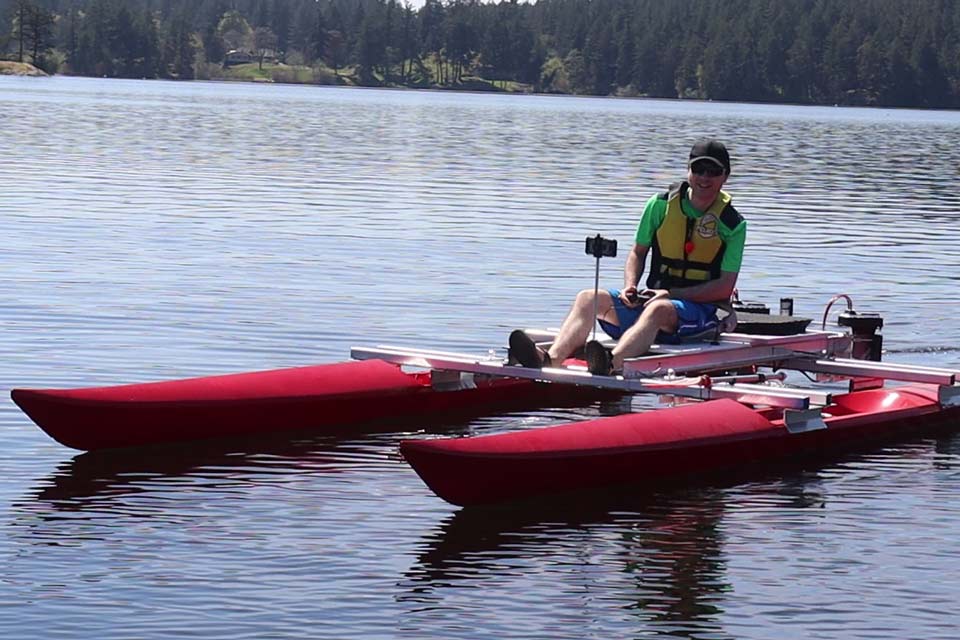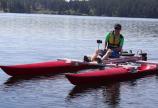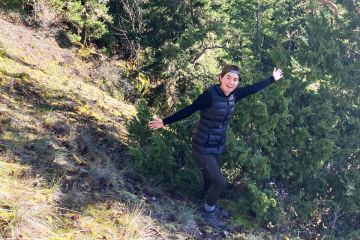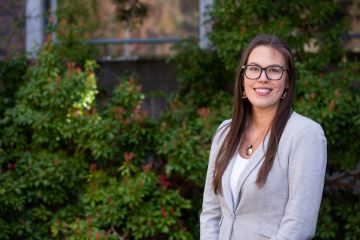Passion for robotics inspires student’s success
- Anne Tolson

Receiving the Governor General’s Silver Medal at UVic’s 2022 spring convocation means Alec Krawciw had the highest academic standing of any student graduating from UVic with a bachelor’s degree.
Somehow, along with achieving a remarkable 95 per cent average grade, the mechanical engineering grad also found time to lead a student engineering team, earn a minor in software engineering, turn a co-op into a part-time job, and volunteer in the community.
How did he do it?
“I get asked that question pretty often,” admits Krawciw. Having a great group of friends made going to classes fun and kept him motivated. He says it also helped to have started university confident in his choice of engineering.
An interest in robotics is sparked
Krawciw’s path to engineering became clear in high school, where he developed a keen interest in robotics as part of an extremely ambitious team that competed internationally three times.
Arriving at UVic, he was intent on being part of a student team that would allow him to further explore his passion, and joined UVic AERO, which focuses on designing and building unmanned aerial systems.
Probably not many people come to their first day of engineering planning to join a student team and trying to figure out which one will be the best fit for their interests. I checked out a lot of teams and really liked the people I met at UVic AERO—I felt that I could make a big contribution.”
—UVic engineering grad Alec Krawciw
By 2019, Krawciw was leading the AERO team. At the same time, and throughout his degree, he volunteered with FIRST Tech Challenge, a global robotics community that advances STEM education among youth.
Krawciw’s long and abiding interest in autonomous systems motivated him to teach himself about various engineering approaches before stepping foot in a classroom.
“It’s my favourite way to learn about something: by experimenting with an idea first, and then learning about it formally afterwards,” he says.
However, that is not always enough. “Learning in a classroom environment is crucial. I’ve enjoyed how many opportunities I’ve had to be exposed to new information that I would have never connected to my own.”
Co-ops enhance in-class learning
Four co-op terms further enriched his skillset and knowledge.
First, he was a summer camp leader at UVic’s Science Venture, where he led some popular and “zany” robotics activities. Next, he worked at the National Research Council’s observatory in Saanich on a project that involved using sensors to detect how the atmosphere distorts the image observed by a telescope. Later, he performed experiments at a Burnaby company that is researching how to create electrical energy from fusion reactions.
His final co-op took place at local firm Gregory C. Marshall Naval Architect, where he was asked to design and build a 20-foot prototype electric hydro-foiling catamaran from scratch.
“The company wanted to get a sense of the challenges and opportunities of getting a hydro-foiling boat working, especially in terms of the control system,” says Krawciw, who continued working part-time for the company several months part-time after the co-op was finished. “I’ll never forget the exhilaration of flying over Prospect Lake during testing.”
The co-op helped give direction to his studies, leading to both an honours thesis that focused on the autonomous docking of a boat and a team capstone project called GLIDE. The Gyro-Levelled Inertial Dog Experience is an automatically stabilizing dog bed designed to prevent seasickness among dogs onboard yachts.
Photos
In this story
Keywords: convocation, robotics, technology, co-op, computers
People: Alec Krawciw, Mina Hoorfar
Publication: The Ring





